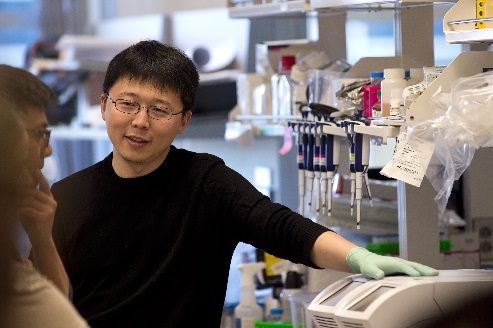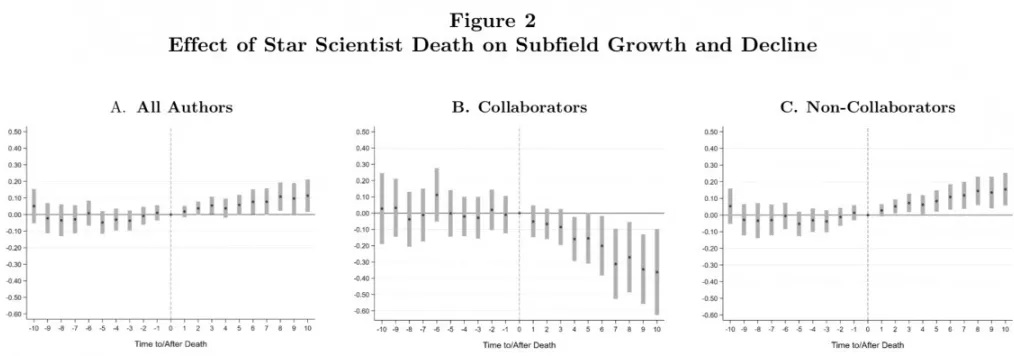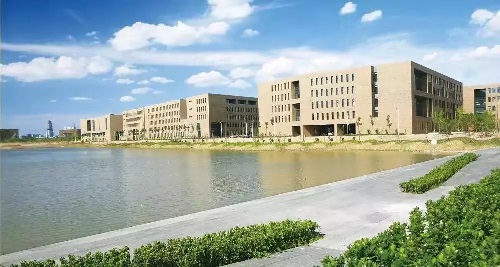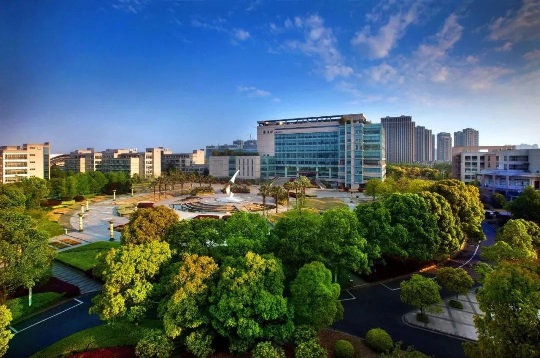When Feng Zhang was a kid growing up in Iowa, he saw Jurassic Park, like just about everybody else. He was struck by the idea that biology might be programmable, like a computer. Now a core member of the Broad Institute of MIT and Harvard, he pioneered a powerful new gene editing system, CRISPR/cas9, that lets scientists rewrite genetic code.
In the past few years, the use of CRISPR has exploded. On Wednesday, all five of the scientists announced as winners of the 2016 Canada Gairdner International Award—a prestigious $100,000 prize that’s often called a precursor to winning the Nobel—worked on CRISPR's development:the others were Jennifer Doudna, Emmanuelle Charpentier, Philippe Horvath and Rodolphe Barrangou.(Anthony Fauci received the John Dirks Canada Gairdner Global Health Award, and Frank Plummer the Canada Gairdner Wightman Award, both for for HIV research.)
After a breakfast in downtown Toronto toasting Zhang and the others, he and I sat in the emptying ballroom, talking about CRISPR and its future.
Feng Zhang, 34, is the youngest head of a lab at the Broad Institute. Photo:Len Rubenstein/Broad Institute Communications
“The field is still very young,” said Zhang, a neurobiologist, who’s accustomed to breaking ground:he’s also one of the co-inventors of optogenetics, a technique scientists use to switch brain cells on and off with light. Researchers have been working with CRISPR for decades in bacteria(it was seen as a way to make better yogurt, for one thing), but it’s only since about 2012 that they could see its promise in human cells. To have netted a Gairdner for this work, when the field is still so young, “is really incredible,” he told me. It speaks to the excitement around this technology.
CRISPR is essentially an enzyme that slices DNA like a pair of scissors, and a guide RNA that takes it to the right spot in the genome.(It was developed from a method that bacteria use to fight off viruses.)Whether CRISPR is a force for good depends on who you ask. Some say it will bring new cures for diseases, hardier crops to feed a hungry planet, and much-needed sources of clean fuel. If you take a darker view, CRISPR ushers in a dystopian age of designer babies and genetically modified people.
Scientists are using it to try to cure HIV, to find new treatments for muscular dystrophy, to understand killer cancers. Scientists have used gene editing to make “micropigs” for pets, and super-muscled beagle dogs. In 2015, a team in China announced they’d charged ahead and used CRISPR to edit(non-viable)human embryos. Some talk about using it to bring back the woolly mammoth, because why not?

Zhang in the lab. Photo:Justin Knight
Often compared to the cut-and-paste program on a word processor, CRISPR is so simple that even DIY biohackers are getting in on it. Anyone with molecular biology skills and a decent lab can theoretically use it to rewrite genetic code.
“CRISPR has democratized gene editing,” Zhang told me.
Zhang’s hope is that CRISPR will give us a better way to understand psychiatric diseases, including depression, schizophrenia, autism and Alzheimer’s. They’re all very hard to study in lab animals, and drug development has lagged. “When the mechanism of disease isn’t clear, developing drugs is hard,” he said. “With CRISPR, we can start to understand the genetic basis of disease.”
He’s working on ways to make gene editing more accurate. “We’re trying to be inspired by nature,” he continued. “Many organisms have evolved interesting DNA repair mechanisms, independent of CRISPR.” He’s very interested in finding enzymes that target RNA instead of DNA, for instance, which is a way to to avoid making inheritable or permanent changes to the human genome.
We aren’t yet at the point of using gene editing to directly treat patients, but that will come. In late 2015, scientists at the Great Ormond Street Hospital for Children in London reported on an experimental method they'd used to treat a baby girl called Layla, who had terminal leukemia. Starting out with donor blood, they edited genes in immune cells to attack her cancer, then infused the baby with those genetically modified cells. It put her in remission long enough to accept a bone marrow transplant—and eventually go home.
They hope to do a clinical trial later this year.
Biologists and ethicists alike are already fretting over a world of “genetic haves” and “have-nots"
When asked about whether he has any concerns around the use of CRISPR—a technology that’s so efficient, and so accessible—Zhang didn’t seem overly worried, putting his faith in the scientific community. “Those are very serious topics that need to be grappled with,” he acknowledged, recognizing that improper use of technology could lead to “undesirable” consequences(what, he didn’t specify).
Scientists were concerned enough that, in December, they convened a meeting in Washington to debate the ethics of what some are already doing in their labs, and what others probably hope to do soon. They’ve put the brakes on using CRISPR to edit human embryos for now. “The good thing is, there was a remarkable level of agreement, despite differences in culture, and the different types of disease that each culture is affected by,” said Zhang. “There is agreement that we need to be very careful.”
But scientists don’t always see eye-to-eye, and governments can opt to strike out on their own. The UK, for one, is alone in approving so-called “three-parent babies,” a modified version of IVF that will help cure certain diseases, but will also pass along inheritable changes to the next generation—changes we can’t later take back. The first baby born of the procedure could arrive as soon as this year.
In the future, if some countries decide to allow genetic editing in human embryos to eliminate disease, even to enhance or select for certain qualities—eye colour, height, intelligence—it’s hard to see how we’ll stop them. Biologists and ethicists alike are already fretting over a world of “genetic haves” and “have-nots,” when genetic tweaks can be paid for.



















